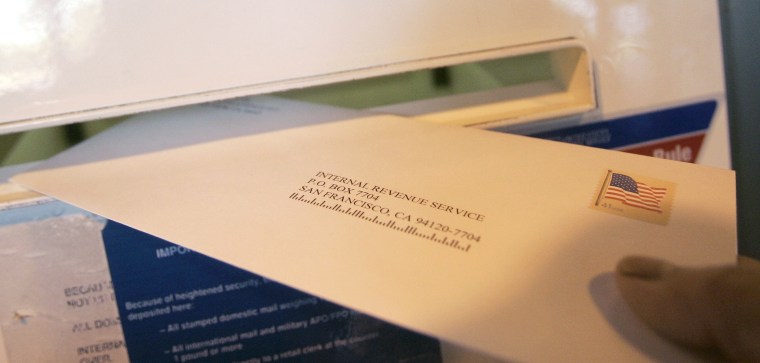With the federal deficit topping a record $1 trillion and rapidly on its way to nearly doubling by this fall, the government desperately needs to squeeze out every tax dollar it can find. That could translate into more audits or at least a letter from the IRS politely asking you to refigure your taxes.
"You're not going to find a document that says this, but it's very clear that in a budget deficit, increased tax collection is another source of revenue," said Ohio State University professor Bill Raabe, a federal tax expert. "It's revenue that should be there that doesn't come in."
The IRS estimates that it fails to collect about $345 billion in taxes each year. The largest chunk of the uncollected portion comes from individual income taxes, which accounts for nearly $200 billion. That explains why you now have a one in 99 chance of getting audited when just 10 years ago it was a one in 202.
"That means that who's going to really feel the brunt of this, who's going to get audited more often in a real sense is the bartender, the waitress, the construction guy," Raabe said.
The IRS has made no secret of its plans to close that tax gap through beefed up enforcement and audits.
"In times when more revenue is needed and the tax gap widens, absolutely the IRS is going to step up audits," said Jackie Perlman, a tax analyst for H&R Block's Tax Institute, which provides research, analysis and interpretation of federal and state tax laws.
Of the billions in individual underreported tax revenue, just over half — about $109 billion — comes from uncollected business income. So if you're a small business owner or you're in a partnership you're much more likely to be audited.
Going after these targeted groups where nonpayment is highest has paid off. Whether it's tax cheats or simply innocent taxpayers who aren't good at math, increased enforcement has netted Uncle Sam an additional $55 billion a year. He's working on plans to capture much more.
The IRS says nearly 84 percent of taxpayers voluntarily pay their taxes on time and its goal is to increase that rate to 86 percent this year. Congressional leaders have asked the agency to reach 90 percent by 2017. That's no simple task given that this number hasn't changed more than a few percentage points in more than three decades.
That tells the government at least a gentle nudge is needed to get some to fully pay up.
To accomplish that, about a year ago the IRS started issuing soft notices, gently-worded letters that say the agency has received information indicating you've received income that you haven't reported, or there's some other discrepancy on your return. The IRS asks you to refigure your taxes and pay more if needed.
Raabe said the friendly tone was adopted as a way to make the IRS seem less heavy handed as it moves to ratchet up the number of audits.
"As the number of individuals picked goes up, you take the chance that you reach a tipping point, where people see big brother as too big," he said. "It shows the IRS is conscious of the big brother backlash."
The soft notice, like all correspondence from the IRS, should be taken very seriously and dealt with quickly, said Perlman, the H&R Block analyst.
"It's kind of an alert that maybe this is something you should be taking a look at," she said.
She suggests seeking help to answer the letter appropriately, if needed.
Note that if you get a soft notice and you repeat the same error the next year, it's like painting a bull's-eye on yourself because the government acknowledges it does follow up and track those returns in subsequent years.
The next level of IRS notice is a correspondence audit, referred to as a CP-2000 letter by the IRS. About 3.5 million such letters have been mailed in recent years. The IRS said such letters brought in an additional $5 billion in 2007. The letters typically point to specific missed items — likely forgotten income, payments, credits or overstated deductions — and will tell you how much more you owe.
Perlman said you'll probably want the help of a tax adviser to respond because the amount the IRS says you owe may be more than you actually should pay.
If you and the IRS can't resolve the issue by mail, it can lead to the dreaded face-to-face meeting with an IRS auditor, in which case you'll certainly want help.
Both the soft letters and the CP-2000 notices are the result of a more aggressive collection effort the IRS calls the Automated Under Reporter program. It plucks out about 16 million tax returns each year that appear to have a discrepancy. About 30 percent — nearly 5 million — are pulled out and looked at by an IRS auditor. If there appears to be something wrong, you'll get mail from the IRS.
You may not realize it, but IRS audits or letters can come at any time during the year. Even if you get your refund and it appears all is well, the IRS could flag a return or question the amount returned to you later in the year. That illustrates the need to keep receipts and documents in a file, just in case.
Although audits are increasing and certain taxpayers — small business owners and those in higher income groups — are more likely to be audited, your chance of being called for an audit is still quite low. If you're an individual with income from an employer that files a W2, it's likely you won't be singled out unless you have extremely high deductions or something else that gets you pulled out of the millions of returns filed each year.
